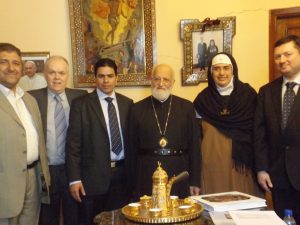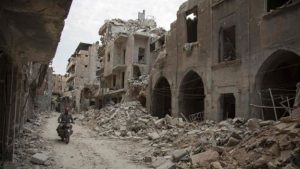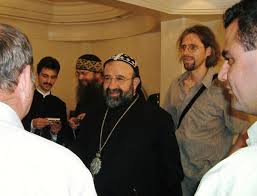
By Sarah Mac Donald - 22 November, 2016

Christian and Muslim leaders from Syria, along with two of the war-torn country’s leading surgeons, are to attend a silent vigil for all victims of terrorism and violence in Dublin on 1 December.
The interfaith delegation will also speak to politicians in the Dáil and address meetings in Trinity College Dublin.
The main leaders of the Syrian delegation are:
His Beatitude, Gregory III Laham, Patriarch of Antioch and All the East, and Alexandria and Jerusalem, who is the spiritual leader of the Melkite Greek Catholic Church;
His Holiness, Ignatius Aphrem II of Antioch, Patriarch of Antioch and the spiritual leader of the Syriac Orthodox Church;
His Grace, Dr Ahmad Badreddin Hassoun, Grand Mufti of Syria;
Dr Ahmad al Khaddour is a cardiothoracic surgeon, a Professor of Medicine at Damascus University and a native of Homs, which was witness to countless atrocities before the Syrian Army stabilised the situation there;
Dr Bashir Mohammad is a cardiologist and a native of Hama, which is still subject to very heavy fighting and countless rebel outrages.

Drs Khaddour and Mohammad will explain how Irish and EU sanctions have caused Syria’s hospitals to degenerate from being on a par with Irish hospitals to a pitiable state where scores of women and children die every day because commonplace medicines, including those used to treat blood clotting, are not available.
The goal of the Syrian delegation’s visit is to send a fact-finding medical, religious, political and humanitarian mission to the Syrian Arab Republic from Ireland, as well as from other independent-minded countries.
They also want to encourage Irish NGOs to send aid to Damascus via Trócaire/Caritas and other transparent and credible conduits.
The situation in Syria, as East Aleppo’s human shields show, remains very grave for all Syrians, from the youngest to the oldest.
Organisers of the visit stress that the EU’s sanctions are killing more Syrian children than ISIS and they claim that the USA has yet to deliver food or medical aid to Aleppo, whereas the Russian air force, despite the ongoing bombardment, continues to fly in tonnes of much needed food, clothing and medicines.
They also believe Ireland can act as “a lodestar for peace and reconciliation” by giving an example on Syria that other countries can emulate.
The Melkite Greek Catholic Church view themselves as the first Christian community, dating back to the time of the Apostles.
Patriarch Laham is a native of Darayya, which was recently liberated, at great cost, by the Syrian Arab Army. Although now 83 years old, Patriarch Laham travels the world, tirelessly working for peace and reconciliation in Syria.
The Syriac Orthodox Church belongs to the Oriental Orthodoxy, which has been a distinct Church body since the schism following the Council of Chalcedon in AD 451, although it claims its roots to the first Christian communities in Antioch in AD 37, described in the Acts of the Apostles (New Testament, Acts 11:26) and established by St Peter.

Mar Gregorios Yohanna Ibrahim in Aleppo (2005) Photo: Sarah Mac Donald
Patriarch Aphrem, who recently survived a rebel assassination attempt, is a native of Qamishli, in north-eastern Syria, an area that has seen ISIS commit unspeakable atrocities against his fellow Arameans and Syriacs, clerics like Bishop Gregorios Yohanna Ibrahim included.
Syro-Aramean men, women and children, along with Shia, Druze, Alawi and Ismaili will remain prime targets of the Western-backed rebels until Ireland and other countries put enough pressure on their sponsors to end their cynical proxy terror campaign.
Mufti Hassoun is a frequent speaker at interreligious and intercultural events due to his pluralistic views on interfaith dialogue.
A native of Aleppo, his son, Sariya, was brutally murdered by rebels on 2 October 2011 for no other crime than for being his son.
As Grand Mufti, he is the highest Sunni authority in the Syrian Arab Republic. Syria’s moderate Sunnis, as well as the confederated Sunni tribes of Deir Ezzor and Palmyra, remain primary targets of ISIS and the other terrorist groups.
The 1 December vigil will commemorate the many moderate Sunni imams, including the world-renowned Islamic scholar Dr Mohamed Said Ramadan Al-Bouti and Cheikh Mohammad Izzat Al Matroud, who have been brutally murdered by rebels.